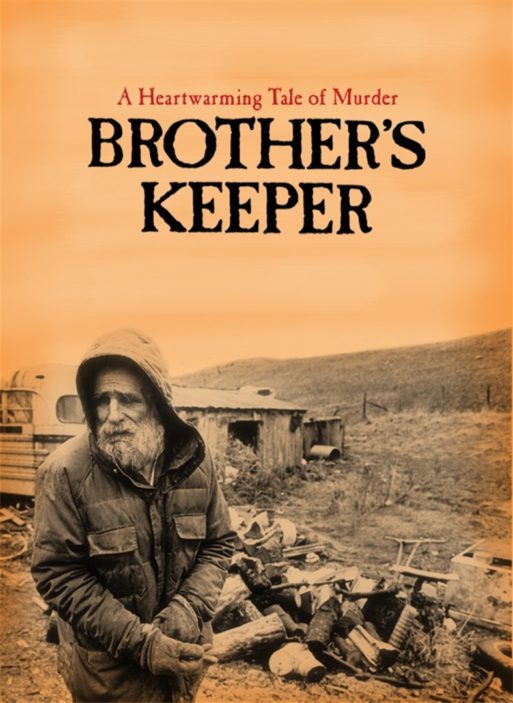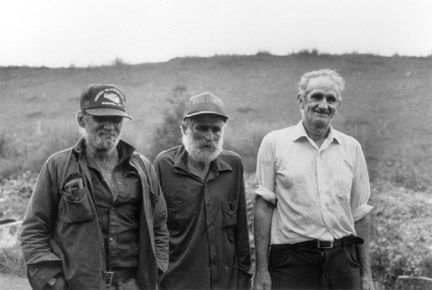 Delbert and William Ward were brothers, living together in a tiny family farm house in the middle of rural Munnsville, New York. They rarely ventured outside of the family farm, only making the trek into town to sell the crops they had grown during harvest season. In their down time, they watched TV together, their favorite show being “Wheel of Fortune.” No one paid any attention to the brothers, as they were outcasts even in their rural community. That is, until one of them turned up dead.
Delbert and William Ward were brothers, living together in a tiny family farm house in the middle of rural Munnsville, New York. They rarely ventured outside of the family farm, only making the trek into town to sell the crops they had grown during harvest season. In their down time, they watched TV together, their favorite show being “Wheel of Fortune.” No one paid any attention to the brothers, as they were outcasts even in their rural community. That is, until one of them turned up dead.
One morning, police were alerted that William Ward had been found dead in his home. He had suffered through a recent illness, which many speculated was the cause of death, yet an autopsy report suggested William had actually died from smothering. Police turned their attention to the only other resident of the house: William’s brother, Delbert. He became a primary suspect for murder.
Munnsville rallied for Delbert’s innocence, defending not only the Wards, but their entire way of life to the outside world.
The ensuing murder trial was wrought with sensationalism and stereotypes. The media went as far as to imply that William and Delbert Ward had had an incestuous relationship, and that William’s death was the result of a sex game gone wrong. Those accusations were never proven in the film, but served to highlight the perceived intrusion that the outside world bestowed on Munnsville. People in the town were painted as being unintelligent hicks, and that Delbert’s alleged murder of his brother was the result of this inherent stupidity. Munnsville rallied for Delbert’s innocence, defending not only the Wards, but their entire way of life to the outside world.
On one level, Brother’s Keeper is about the death of William Ward and the mysterious circumstances surrounding it. On a deeper level, the directors describe the vast cultural differences between people in rural communities and their big city neighbors. Despite living in relatively close proximity to one another, their lives walk along drastically different paths.
The Wards only had a marginal education, and could barely read or write. Like many generational farmers of the past, they felt that a formal education was not as important as understanding how to tend to the farm. It was this lack of formal education that made Delbert Ward a prime suspect, according to the documentary. Police easily coerced him into misleading statements about his brother’s death, managing to get a confession out of him for the alleged murder. Delbert couldn’t possibly have read the written statement that they had him sign, as his reading skills were limited at best. Confession in-hand, the police painted Delbert as a jealous, angry man who killed his brother in a rage.
Residents could imagine Delbert feeling sorry for his ailing brother, and wanting to spare him from further pain.
Many Munnsville residents see an entirely different side to the story. The few that believed Delbert smothered William said that he did it out of mercy, not anger. It is true that William had serious health problems before his death. Residents could imagine Delbert feeling sorry for his ailing brother, and wanting to spare him from further pain. As someone who had little education or contact with the outside world, it’s possible that Delbert didn’t know what other resources were available, and that he viewed the act of killing his brother as the only noble option, according to residents.
To this day, no one is certain what happened to William Ward, or whether his brother had something to do with his death. Delbert was acquitted at the trial when a lack of physical evidence and a coerced testimony marred the police’s case against him.
The film strongly implies that Delbert had something to do with William’s death, but only in the sense that it was a mercy killing. It is difficult to imagine that anyone would be unaware of the resources available to people suffering from illnesses, but for two brothers with little education and limited contact with the outside world, it’s not impossible. The documentary proves that culture and resources have an immense impact on how people view death, and that for some, mercifully ending a life is a humane act, rather than evil.

 Brother’s Keeper by Joe Berlinger and Bruce Sinofsky
Brother’s Keeper by Joe Berlinger and Bruce Sinofsky



 Recovering Cremation Remains After the Los Angeles Fires
Recovering Cremation Remains After the Los Angeles Fires
 “As Tears Go By” by Marianne Faithfull
“As Tears Go By” by Marianne Faithfull















